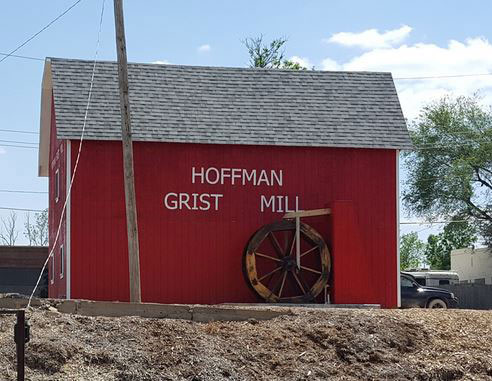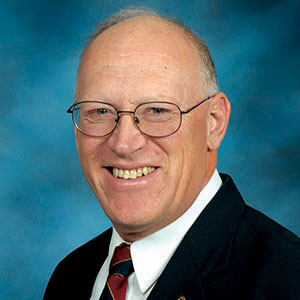
Hoffman Grist Mill. | Download this photo
Kansas Profile – Now That’s Rural: Hoffman Grist Mill
June 28, 2023
By Ron Wilson, director of the Huck Boyd National Institute for Rural Development at Kansas State University
“Flour power!”
In this case, I’m talking about the flour made from wheat. Today we’ll learn about a Kansas grist mill that is producing flour and benefitting the local economy.
Last week we learned about the Abilene and Smoky Valley Railroad, which runs excursion trains from Abilene to Enterprise, the location of the Hoffman Grist Mill. The mill is managed by Debbie and Terry Thompson. Thanks to railroad volunteer and retired K-State department head Steve Smethers for today’s story.
In the 1860s, a miller named Christian Hoffman migrated from Sweden to Kansas. He saw a place along the Smoky Hill River where he could build a dam for a turbine that would power a grinding stone to grind wheat into flour. The Hoffman Grist Mill began operation in 1869.
The mill initially produced about 60 barrels of flour a day. It became the focal point of the area, spawning a small community of settlers, many of whom worked for Hoffman’s mill.
“The optimism and spirit of those settlers gave birth to the name of the village,” Smethers said. “In honor of Mr. Hoffman’s indefatigable spirit and the enterprising people who settled in the area, the community was named Enterprise.”
Hoffman’s milling business grew. By the turn of the 20th century, the Hoffman Grist Mill produced 1,200 barrels of flour daily. His flour was sold nationwide and beyond.
“In the era preceding hard red winter wheat -- the variety that is grown by Kansas producers today -- the River Valley farmers in the late 1800s grew Heritage Turkey Red, a strain of wheat brought to the region by Mennonite settlers,” Smethers said. “Turkey Red made an excellent flour, and the availability of Hoffman’s mill as a customer market ensured that area farmers grew a lot of the Russian wheat variety.”
In 1886, the Chicago, Rock Island and Pacific Railroad was built through Enterprise, just south of the Hoffman Mill on the banks of the Smoky Hill River. A year later, the Atchison, Topeka and Santa Fe also entered Enterprise near the mill on the east side. The mill prospered for decades but closed during the Great Depression.
Joe Minnick, the founder of the Abilene and Smoky Valley Railroad and a native of the area, was always fascinated by the Hoffman story. He decided to design and build a replica of the original mill on the south side of the Abilene and Smoky Valley right of way, across the street from Hoffman’s original plant.
Minnick located grinding stones and other milling equipment that he fashioned into a reincarnation of the Hoffman Mill. He even commissioned area farmers to grow Heritage Turkey Red wheat for the replica mill, which opened in 2016.
Today, the Hoffman Grist Mill produces several varieties of flour, including whole wheat, “bolted” or sifted white flour, and farina (often prepared as hot cereal). The mill also sells whole kernel wheat berries and corn meal, and produces a pancake mix, seasoned flour, and other special wheat-based products that are popular with tourists, train passengers, and area bakeries.
One local baker uses grist mill flour in making the cinnamon rolls that are served on A&SV coffee break trains. Also available at the grist mill are meat, cheese, honey and other locally produced products.
Visitors can drive to the mill, or when riding the excursion train, can tour the mill while the railroad’s engineers turn their diesel or steam locomotives around for the return trip to Abilene.
“The Hoffman Mill is a popular attraction for tourists, school children and train passengers,” Smethers said.
It’s a wonderful asset for a rural community such as Enterprise, population 708 people. Now, that’s rural.
For more information, see www.hoffmanmill.org.
Flour power. In this case, the Hoffman Grist Mill is producing flour and helping power the local economy. We commend Joe Minnick, Debbie and Terry Thompson, Steve Smethers, and all those involved with the Hoffman Grist Mill for making a difference by honoring the history of local wheat milling.
As Smethers says: “The enterprising spirit which Christian Hoffman showed lives on in Enterprise.”
Flour to the people!
Audio and text files of Kansas Profiles are available at http://www.kansasprofile.com. For more information about the Huck Boyd Institute, interested persons can visit http://www.huckboydinstitute.org.
***
The mission of the Huck Boyd National Institute for Rural Development is to enhance rural development by helping rural people help themselves. The Kansas Profile radio series and columns are produced with assistance from the K-State Research and Extension Department of Communications News Media Services unit. A photo of Ron Wilson is available at http://www.ksre.ksu.edu/news/sty/RonWilson.htm. Audio and text files of Kansas Profiles are available at http://www.kansasprofile.com. For more information about the Huck Boyd Institute, interested persons can visit http://www.huckboydinstitute.org.


